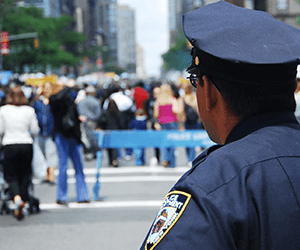The mental health of law enforcement officers has long been overlooked. Statistics continue to reinforce this fact, painting a grim picture of the current state of those who have sworn to protect and serve entire communities.
While being a police officer can be a rewarding job, it can be mentally taxing as well. With every assignment comes the possibility of witnessing something that can be disturbing. Incidences of child abuse, suicide, domestic violence, officer-involved shootings, and more can be a regular part of the job. Over time, it takes a toll.
Whether you serve in a law enforcement, court, or corrections setting, understanding the challenges police officers face is vital to deepening your impact. Learn about some of these challenges and the importance of advocating for more awareness.
5 Reasons the Mental Health of Police officers Must Be Prioritized
1. Police officers report higher rates of depression, anxiety, and post-traumatic stress disorder (PTSD).
According to the latest law enforcement statistics by the National Alliance on Mental Illness (NAMI), police officers report much higher rates of depression, burnout, PTSD, and anxiety than the general population. In addition, almost 25% of police officers have experienced suicidal ideation at least once in their lifetime.1
2. More police officers die by suicide than in the line of duty.
The suicide rate for law enforcement officers is one of the most alarming statistics published by NAMI. Not only do more police officers die by suicide than they do in the line of duty, but this rate increases to over three times the national average for those serving in the smallest departments. And when compared with firefighters, the suicide rate for police officers was four times higher.1
3. Productivity is negatively affected by poor mental health.2
Completing required tasks is vital to effectively serving in any role, whether within the criminal justice system or beyond. However, the job functions of police officers are critical to public safety. Duties include enforcing local and state laws, preparing for disaster and/or emergency situations, acting as a criminal investigator, giving court testimonies, and carrying out various methods of crime prevention. When the productivity of a police officer drops—often caused by mental strain—the public at large is put at risk.
4. Most law enforcement officers do not seek care for mental health issues.
The stigmatization of mental health is a major factor that prevents police officers from getting help. In an anonymous survey of more than 400 Dallas Police Department personnel, four primary barriers to mental health service access were identified:3
- Inability of police officers to recognize when they are experiencing a mental health issue
- Concerns regarding confidentiality
- Belief that mental health professionals cannot relate to those working in law enforcement jobs
- The notion that those who seek mental health services are unfit to serve as officers in the criminal justice system
Consequently, less than 20% of police officers with confirmed mental health issues had sought services in the previous year.
5. Despite lack of treatment, mental health illnesses are prevalent among those with law enforcement jobs.
The prevalence of lifetime mental illness diagnoses was a key focus in the Dallas Police Department study. Findings showed that the odds of a lifetime mental illness diagnosis were much higher among female officers than male officers. The odds were also higher for military veterans versus nonveterans, and for unmarried, divorced/separated, or widowed officers. Additionally, mental illness diagnoses were more prevalent among officers with more than 15 years of law enforcement career experience.3
Position Yourself to Impact the Criminal Justice System With a Master’s in Criminal Justice
In Walden University’s MS in Criminal Justice program, you can become empowered to create meaningful social change in your organization and community. Choose from eight highly relevant specializations—such as Cybercrimes, and Law and Public Policy—to focus your studies on the criminal justice topics you’re most passionate about. And if you’re looking to just get started in the field or pursue your terminal degree, Walden also offers BS in Criminal Justice and PhD in Criminal Justice programs.
Thanks to Walden’s online learning platform, you can continue to work full time while earning your master’s in criminal justice. With an internet connection and computer access, you can take online classes and complete your coursework at whatever time of day works best for you.
Walden University is an accredited institution offering BS in Criminal Justice, MS in Criminal Justice, and PhD in Criminal Justice degree programs online. Expand your career options and earn your criminal justice degree using a convenient, flexible learning platform that fits your busy life.
1Source: www.nami.org/Advocacy/Crisis-Intervention/Law-Enforcement
2Source: www.cdc.gov/workplacehealthpromotion/tools-resources/workplace-health/mental-health/index.html
3Source: https://jamanetwork.com/journals/jamanetworkopen/fullarticle/2771400
Note on Licensure Walden’s PhD in Criminal Justice program is not considered a Professional Peace Officer Education program for the state of Minnesota and is not designed or intended to prepare graduates for licensure as a peace officer, police officer, or other law enforcement officer in any state.
Walden University is accredited by The Higher Learning Commission, www.hlcommission.org.





